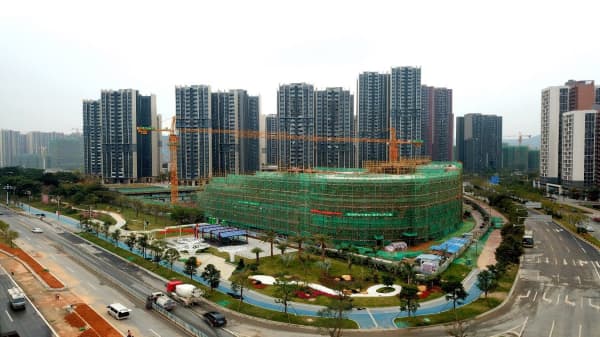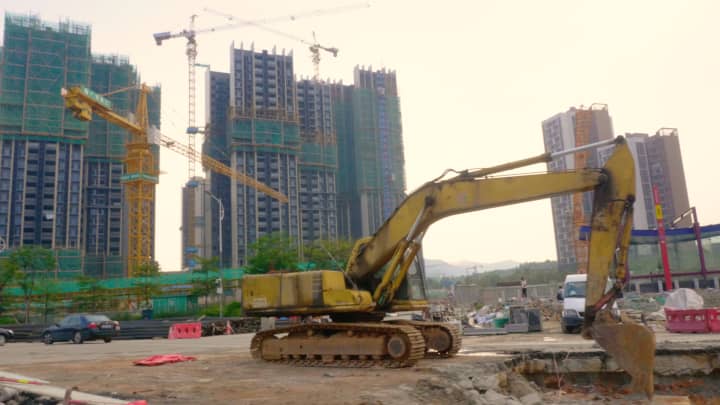
Guangzhou Science City is a modern science park in Guangzhou Development District. CHINA DAILY
Guangzhou Development District has made strong progress in constructing 500 megaprojects in 10 major industries this year, despite the lingering slowdowns from the COVID-19 pandemic.
Gu Xiaobin, chief economist of GDD, said the district will complete investment valued at 129.1 billion yuan ($19.97 billion) for the projects this year.
"Construction of the 500 megaprojects that cost more than 1.23 trillion yuan was aimed at building GDD into a major production base of innovation as well as new and high-tech industries in the Guangdong-Hong Kong-Macao Greater Bay Area in the years to come," Gu said at a news conference on Friday.
To promote and speed up construction of the megaprojects, GDD has organized nine rounds of group contract signing and construction commencement ceremonies for the megaprojects since late 2019.
The megaprojects are expected to play a big part in accelerating economic growth in GDD and the entire city in the following years, Gu said.
GDD deems the megaprojects a present for celebrating the 100th birthday of the Communist Party of China on July 1, he said.
Of the projects, 29 reach an investment scale of more than 10 billion yuan each and 166 have an investment scale of more than 1 billion yuan each, Gu said.
Located in the eastern part of Guangzhou, capital of Guangdong province, GDD in the prosperous Pearl River Delta is now home to a myriad of well-known foreign and domestic companies involved in the industries, which include artificial intelligence, biomedicine, chips, information, 5G, smart manufacturing, big data, new energy, new materials, culture, education, tourism and related cutting-edge technologies.
With more than 3,000 biomedicine companies, GDD has become a new innovation and production base of Guangdong province's biomedicine industry. The district's industrial production scale in the biomedicine industry is expected to reach more than 100 billion yuan in the coming years.
Earlier this year, biotech company BeiGene kicked off construction on its fourth plant in GDD, playing a role in helping build the district into one of the largest production bases for anti-cancer drugs in Asia.
With the completion of its fourth plant, BeiGene's anti-cancer production capacity will come to more than 120,000 liters, with its maximum capacity reaching 200,000 liters.
That expanded capacity will make it one of the largest anti-cancer drug production bases in Asia.
Construction of the megaprojects have further spurred the industrial development of GDD in the previous years.
According to Gu, those manufacturing enterprises each with annual business revenue surpassing 20 million yuan in the district realized total industrial output of more than 800 billion yuan and GDD posted a commodity sales volume of more than 970 billion yuan last year.
Yang Yuanshi, director of the district's reform and development bureau, said the GDD's GDP grew 20.6 percent year-on-year in the first quarter of 2021, which is faster than the average growth of the country, Guangdong province and Guangzhou city.
GDD's total finance and taxation revenue increased by 31 percent year-on-year and the profit of enterprises grew by 88.7 percent year-on-year in the first five months of 2021.
And it is expected to keep its strong momentum in the following months, he said.
According to Chen Weiquan, director of the district's bureau of science and technology, the bureau will try to build GDD into a destination with a powerful strategic science and technology force, dynamic industrial technology innovation system and attractive innovation ecological environment in the coming years. He promised to better serve the scientific and technological companies that settle down in GDD.
Xu Dan, director of the district's bureau of industry and information, said the bureau will provide space element support for high-quality development of the manufacturing industry in GDD through new land planning, developing new industries and accelerating reconstruction and upgrade in the coming months.
When all the megaprojects have been completed and production starts, they are expected to earn revenues of more than 1 trillion yuan in the future, driving the district's industrial production and sales volume of commodities to exceed 1 trillion yuan respectively.
Meanwhile, construction of the megaprojects also helped drive fixed asset investment to grow 18.2 percent year-on-year in 2020 and 61 percent year-on-year in the first five months of 2021.
To further promote the development of new and high-tech and innovative technologies, GDD is sparing no effort to attract high-quality talents from home and abroad.
Famous scientists and academicians, including Zhong Nanshan, Zhang Boli and Shi Yigong, have set up their labs, research institutes and companies to begin their research and production in GDD, Gu said.
The district is also speeding up its education industrial development by attracting renowned colleges and universities from home and abroad to build their campuses.
Having attracted renowned domestic and foreign schools to settle down in the district, the district has now increased its enrollment by more than 63,000 students.
And the research institutes of Central University of Finance and Economics, Xidian University and Guangdong University of Foreign Studies have also begun recruiting new students.
GDD is also accelerating the preparation and construction of Huangpu University and Guangzhou Jiaotong University to further integrate the development of industrial development and scientific research with higher education.
To achieve the goal, the district is also speeding up construction of infrastructural facilities to further improve the district's living and working environment.
In addition to advanced highway networks that link the district to ports, railway stations and airports in the southern Chinese region, GDD is accelerating construction of the eastern extension line of the district's rail transit line 5 and the second phase of the district's rail transit line 7 as well as other major communication projects and facilities.
The district's mileage of rail transit will be increased from 66.6 kilometers to 149.6 km, an increase of 124.6 percent, when the two rail transit projects are completed.
Construction of a branch of Nanfang Hospital, a major hospital in Guangzhou, and the Affiliated Women and Children's Hospital of Guangzhou Medical University, is now nearly completed and they will increase inpatient beds more than 50 percent.
Meanwhile, the district has planned to construct more than 46.5 km of greenways while building a number of ecological civilization demonstration zones, civilization villages and modern agricultural parks, through reconstruction of its old downtown areas in the following years.
The improved public facilities have helped transform the district from an industrial development zone into one of the major destinations suitable for business startups, innovation, living and working in the southern Chinese region.
GDD now has a permanent population of more than 1.26 million, an increase of 430,000, or 52 percent, when compared to the figure recorded a decade ago.
The proportion of the population with at least a university education level has doubled.


